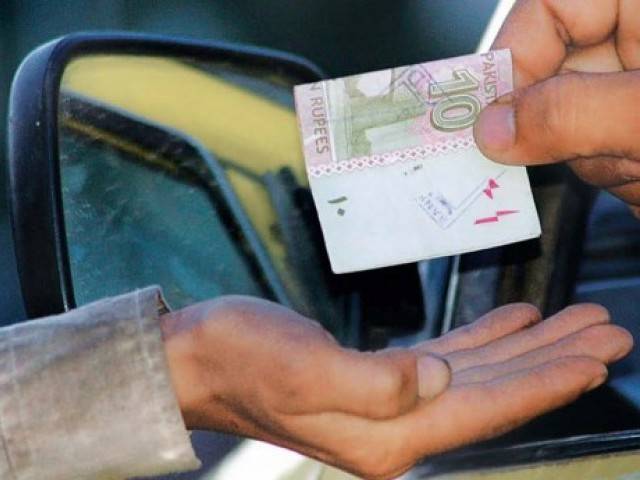ISLAMABAD - Pinky, 6, kept navigating from one car to another. She would keep on knocking at car's window to draw rider's attention, waiting the signal to turn green.
To the surprise of motorists, little kid who should have been enrolled in some school was fluently speaking English language to collect money.
As the mercury rose up late in the morning on Sunday, she swiftly approached to my car as I stopped at Varan signal, knocked my car's window to draw my attention. To my surprise, the bare-footed little girl spoke in English fluently.
"Please donate me fifty rupees. Allah Almighty will reward you with seventy beauties in heaven," the little girl said. She swiftly moved to another car after getting a note of twenty rupees, probably to storm at window of another car.
Pinky was not alone at Varan traffic signal Rawalpindi. Rather, a dozen of malnourished, disabled and disadvantaged children were swiftly moving between dozens of cars stopped at signal to collect spare change not only to feed themselves, but also to police, and their facilitator. However, police officials deny the charges.
Menace of begging is fast spreading across the garrison city of Rawalpindi which is home to Pakistan's army establishment. Situated at a distance of few hundred yards away from Army's General headquarters, 'Rawalpindi Saddar' is hub of beggars.
Investigators have collected enough evidences to prove that begging has turned into a flourishing business with powerful mafia controlling key locations only to deploy their lackeys. Even in some cases, mafia leased out places to groups of beggars on monthly basis.
"It has become an attractive business. Even city’s influential people are allegedly running this business," an investigator told The Nation on condition of anonymity. He added that begging has turned into organised business with influential mafia backing it. Three years back in 2011, Lahore High Court asked authorities to form legislation to discourage begging. However, authorities are yet to comply with the court order. In Rawalpindi, hundreds of malnourished kids, men and women can clearly be seen begging on roads and streets.
Secret agencies have warned law enforcement agencies several times that beggars were a potential threat in garrison city of Rawalpindi.
"Terrorists may attack targets in Rawalpindi in disguise of beggars. There is a dire need to discourage begging in Rawalpindi," stated a report of one of intelligence agencies of Pakistan.
An official of Investigation Bureau (IB) told The Nation that begging mafia enjoyed backing of politicians, policemen and higher officials of Tehsil Municipal Authorities.
"The mafia has deep pockets. They are too influential even police is afraid to break into their gang," said the official on condition of anonymity.
In some cases, police have arrested a number of beggars. However, their facilitators easily get them out of jail on bail.
"Police also arrest beggars, but they easily manage to get out on bail," said Aftab Tanoli, a Rawalpindi based lawyer.
According to information collected by The Nation, four major gangs of beggars are working in Rawalpindi city.
According to data collected by The Nation from various sources, a beggar collects 150 to 500 hundred rupee daily. While a beggar's annual income ranges between 350,000 to 450,000 rupees. Investigators term it as a growing industry with annual turnover of 70-80 billion rupees.
Ali Imran, a social worker blames rising poverty behind large number of kids and women coming out on streets and roads for begging. "It's the poverty which prompt most of people to beg on roads and streets. Most of the beggars are in genuine need. Government has to do something to discourage begging," Ali Imran said. According to a report of United Nations 49 per cent of estimated 180 million of Pakistani nation live below the line of poverty.
Wednesday, December 04, 2024
Capital beggars

Caption: Capital beggars
11:03 AM | December 03, 2024
PRCS marks Int’l Day of Persons with Disabilities
December 04, 2024
CM Bugti emphasises for ensuring transparency in development programme
December 04, 2024
Sukkur Barrage to remain closed from Jan 6-20
December 04, 2024
-
Three new polio cases reported in Pakistan, total rises to 59 in 2024
-
Three new polio cases reported in Pakistan, total rises to 59 in 2024
-
Nationwide internet disruptions cause major challenges for users
-
Gallup survey: 47pc of Pakistanis never used trains
-
Digital nomadism redefines work and travel across the globe
-
Lahore tops global pollution rankings as smog worsens, AQI reaches hazardous levels
Crisis in Korea
December 04, 2024
COAS’ Resolve
December 04, 2024
Crippling Social Media
December 04, 2024
Biden’s Last Gasp
December 03, 2024
Slashing Inflation
December 03, 2024
Major Environmental Problems in Balochistan
December 04, 2024
Contemporary Discipline Issues in Academics
December 04, 2024
Unprivileged Area
December 04, 2024
Beware of Product Warranties!
December 04, 2024
Law and Order
December 04, 2024
ePaper - Nawaiwaqt
Nawaiwaqt Group | Copyright © 2024





